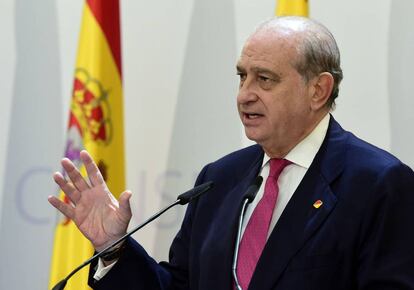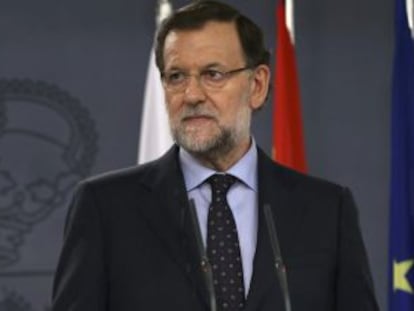Secret recordings drag Spanish minister into conspiracy scandal
Acting Interior chief Jorge Fernández Díaz says revelations of his talks with anti-fraud agency to go after Catalan politicians is motivated by the upcoming elections

With four days to go before Spain holds a fresh general election, the country’s political scene is being roiled by a scandal affecting acting Interior Minister Jorge Fernández Díaz.
A left-leaning online newspaper, Público, has revealed secret recordings of two-year-old conversations between the Popular Party (PP) official and the head of the Anti-Fraud Office of Catalonia (OAC), in which both men discuss the possibility of targeting Catalan pro-independence politicians – or their close relatives – in corruption probes.
Candidates speak out
Pedro Sánchez (PSOE): "Mr Fernández Díaz has to quit politics immediately. He cannot remain in his position."
Pablo Iglesias (Podemos): "This is one of the gravest things to ever have happened in this country."
Albert Rivera (Ciudadanos): "In a democracy, the police is at the service of democracy, not at the service of political parties."
The candidates for the Socialist Party (PSOE), Podemos and Ciudadanos on Wednesday asked for the minister’s resignation over his alleged attempt to seek criminal charges against members of Convergència and the Catalan Republican Left (ERC) for political reasons.
But acting Prime Minister Mariano Rajoy said it is all part of a politically motivated move against the PP, which polls suggest will win the Sunday election again while falling short of a parliamentary majority.
“This is the same old story: we’re four days away from the end of the campaign and there are those who are trying to make the most of it, by fishing in troubled waters to see what they pull out,” he said at an event in Sóller, in the Balearic Islands. Rajoy added that he has “full confidence” in his minister.
Meanwhile, Fernández Díaz himself has said that “accusing me of conspiring to commit a crime is injurious, slanderous and stupid.”
Sign up for our newsletter
EL PAÍS English Edition has launched a weekly newsletter. Sign up today to receive a selection of our best stories in your inbox every Saturday morning. For full details about how to subscribe, click here.
“The only conspiracy we can talk about is the fact of recording a conversation and releasing it two years later. These days, it’s shoot first and ask later,” added the acting minister.
Most Catalan parties have also demanded Fernández Díaz’s resignation, as well as that of Daniel de Alfonso, the man who headed the Anti-Fraud Office at the time and who is heard in talks with the minister.
The main unions representing law enforcement officers in Spain have also issued a release requesting that Fernández Díaz be removed from his post.
De Alfonso has denied the charges and said “it is false” that he and Fernández Díaz were conspiring to act as a political police of sorts. Both conversations took place “a couple of years ago” and “did not result in any report or any proceeding. They amounted to nothing,” he told Catalunya Ràdio.
The recordings date from October 2 and 16, 2014, according to Público. Catalonia held a non-binding referendum on independence on November 9, 2014 which the PP government at the time fiercely opposed.
The cases discussed in the recorded talks involve Roger Junqueras, brother to ERC leader Oriol Junqueras, who also serves as Catalan deputy premier. Roger worked at Cespa when this company won a contract from the Catalan government. Another name mentioned in the conversations was Felip Puig, a senior official at Convergència and an office holder in the Catalan government on several occasions.
English version by Susana Urra.
Tu suscripción se está usando en otro dispositivo
¿Quieres añadir otro usuario a tu suscripción?
Si continúas leyendo en este dispositivo, no se podrá leer en el otro.
FlechaTu suscripción se está usando en otro dispositivo y solo puedes acceder a EL PAÍS desde un dispositivo a la vez.
Si quieres compartir tu cuenta, cambia tu suscripción a la modalidad Premium, así podrás añadir otro usuario. Cada uno accederá con su propia cuenta de email, lo que os permitirá personalizar vuestra experiencia en EL PAÍS.
En el caso de no saber quién está usando tu cuenta, te recomendamos cambiar tu contraseña aquí.
Si decides continuar compartiendo tu cuenta, este mensaje se mostrará en tu dispositivo y en el de la otra persona que está usando tu cuenta de forma indefinida, afectando a tu experiencia de lectura. Puedes consultar aquí los términos y condiciones de la suscripción digital.










































